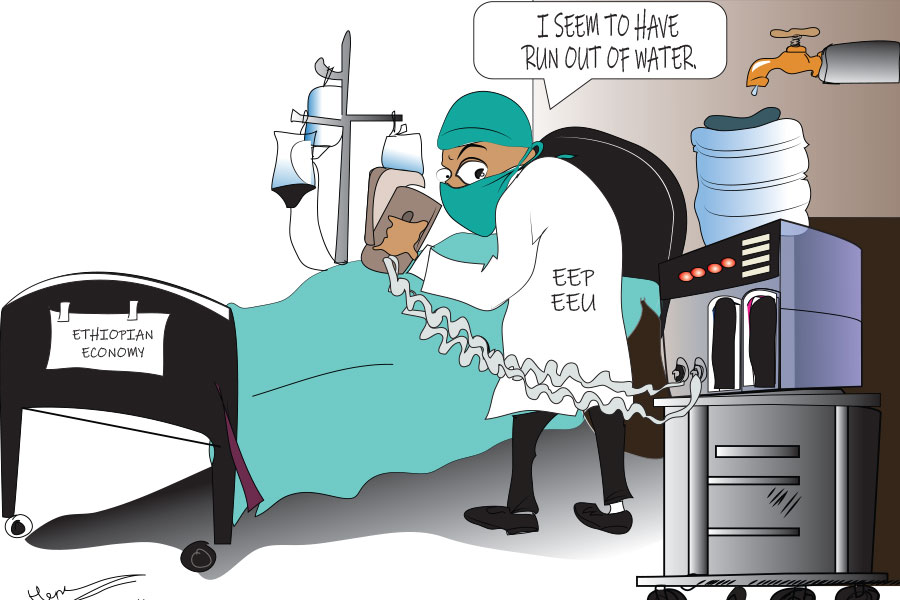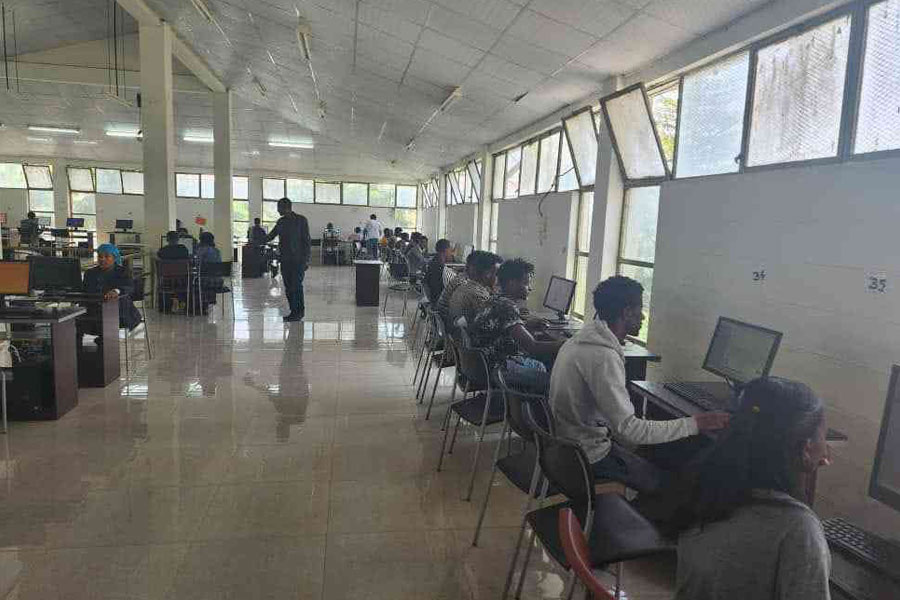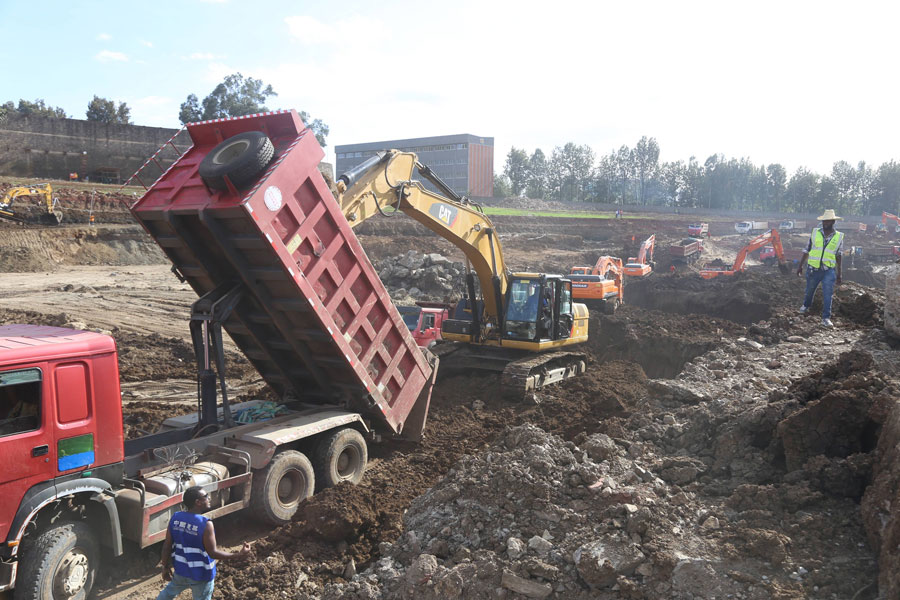
Editorial | May 25,2019
A man accompanied by a group of three women shuffles to the reception desk of a dentist’s office on Churchill Road holding a damp soft-tissue paper in his fist.
“He just knocked out one of his teeth,” says one of the women in his entourage, her voice pleading, anxious and expectant of a good outcome. “Can it be put back in?”
“It depends. The doctor has to look at it,” comes the lukewarm response from behind the desk.
“It had only been a day. He knocked it out just yesterday, and we came all the way from Meqele,” the woman continues to implore, as she points to the man with a forward tug of her chin.
At this signal, the man slouches nearer to the receptionist, produces and unwraps the soft-tissue paper, and presents a blood-stained canine tooth to the clerk. She takes a quick look and recoils but recovers quickly to direct the group to take seats in the waiting area.
They join others who are sitting around in a small central court area where the glass-partitioned examining rooms of the doctors are arrayed in a circle around them. Cleaning ladies, in slippers, with single plastic gloves covering one of their hands and wearing ill-fitting surgical masks, constantly zoom in and out of the examination rooms carrying red buckets brimming with medical waste.
The sterile, sanitised and clean examining rooms one expects in dental clinics of the West are nowhere in sight here. The treatment rooms have no wash station, suction devices, drainage system, rinse equipment or waste disposal units. In general, the clinic fails to meet the standard clinical asepsis and sterile conditions of modern dentistry.
But even modern medicine has limits and the replanting of a knocked-out tooth lays in that boundary between possibilities and miracles. We are not expecting miracles in our medical offices, but the very minimum standards of modern practices of hygiene are to be practised. What is possible is for the private sector and the professional class to take the lead in modernising Ethiopia.
We may expect backwardness in a government-run dental office, but why has modernism eluded the professional class in Ethiopia?
The modern Ethiopian professional, whether a dentist, an engineer, architect or a physician is swallowed in the same vortex of underdevelopment that has taken over the country. Surely, they are exposed to the standards and practices of contemporary modern dentistry, engineering, architecture, and medicine; but why do they pay lip service when it comes to applying it in Ethiopia?
Efficiency and modernity in our country are considered cumbersome and unnecessary to develop Ethiopia by many in the professional class. As if the path to progress can be short-circuited by adapting the veil of modern life now, and by postponing and pushing away the hard work to an uncertain future.
Innovations and progress are the natural harbours of the private sector, but that sector in Ethiopia is scrambling to find safe harbours in government largess of tax cuts, incentives, favourable land grants, and other state favours.
Do the Ethiopian professional class and the private sector have some inherent character flaw that keeps them from leading the modernization of the country?
Perhaps, but the likely cause is that we feel very little obligation to give back to our country.
“We are enamoured by the West and the conspicuous displays of Western wealth,” as was once written in a 2000 Economist article, but we rarely take the necessary steps and responsibilities to create and share that wealth with our fellow citizens.
A possible explanation of this lack of innovation and motivation in the private sector to modernise itself may be found in the overwhelming, omnipresent and consistent interference of a government that pokes its nose into every aspect of life in the country.
The government exercises control on various levels of human activity of the private citizen from setting taxi tariffs to rationing sugar and cooking oil; the state exerts its controls through monopolies in telecommunications, logistics, and the financial sector; it forms youth associations and assigns them major public projects and mining concessions; and even involves itself in the manufacture of drones and x-ray machines.
The government’s interference has created insecurities that have curtailed the modernisation of the private sector. It is the national landlord that dolls out land resources to investors with little or no impact assessment, and it is the proprietor that rarely assumes responsibilities for the maintenance and upkeep of the properties that it owns.
In this atmosphere of near total state control of the economy and land resources of the country, the citizens and the private sector have little incentives to invest in modernisation and innovation.
A long history of accepting largess in Ethiopia has perpetuated a dependency of the government that has further misdirected its role in the economy.
Development has arrived at a professional, privately-run dental clinic in the heart of the city with all its accoutrements. Alas, it has arrived without the functions and details required of modernity. But the clinic is one of the few places in the country where a semblance of dentistry can be available to those who can afford it.
At last, the man with the missing tooth is called into the examination room but discharged briefly with an apparent bad news. One of the women has followed him in and they both emerge much more subdued than when they went in. They no longer have the urgency and anxiety of the long wait. The man, now relieved of his tooth and its tissue-paper rapping, led the way to the elevators and down to Churchill Road where they soon join the noise and clutter of the city.
PUBLISHED ON
[ VOL
19 , NO
968]


Editorial | May 25,2019

Radar | Jan 19,2024

Radar | Mar 02,2024

Fortune News | Dec 09,2023

Radar | May 12,2024

Fortune News | Aug 05,2023

Radar | Aug 18,2024

Radar | Jun 11,2022

Fortune News | Oct 31,2020

Radar | Aug 21,2023

Dec 22 , 2024 . By TIZITA SHEWAFERAW
Charged with transforming colossal state-owned enterprises into modern and competitiv...

Aug 18 , 2024 . By AKSAH ITALO
Although predictable Yonas Zerihun's job in the ride-hailing service is not immune to...

Jul 28 , 2024 . By TIZITA SHEWAFERAW
Unhabitual, perhaps too many, Samuel Gebreyohannes, 38, used to occasionally enjoy a couple of beers at breakfast. However, he recently swit...

Jul 13 , 2024 . By AKSAH ITALO
Investors who rely on tractors, trucks, and field vehicles for commuting, transporting commodities, and f...

Oct 18 , 2025
The political establishment, notably the ruling party and its top brass, has become p...

Oct 11 , 2025
Ladislas Farago, a roving Associated Press (AP) correspondent, arrived in Ethiopia in...

Oct 4 , 2025
Eyob Tekalegn (PhD) had been in the Governor's chair for only weeks when, on Septembe...

Sep 27 , 2025
Four years into an experiment with “shock therapy” in education, the national moo...